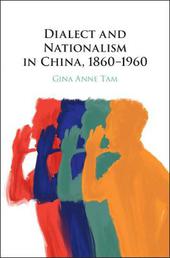
|
Dialect and Nationalism in China, 1860-1960
Hardback
Main Details
| Title |
Dialect and Nationalism in China, 1860-1960
|
| Authors and Contributors |
By (author) Gina Anne Tam
|
| Physical Properties |
| Format:Hardback | | Pages:272 | | Dimensions(mm): Height 235,Width 159 |
|
| Category/Genre | Historical and comparative linguistics
Asian and Middle Eastern history
Oral history |
|---|
| ISBN/Barcode |
9781108478281
|
| Classifications | Dewey:306.44951 |
|---|
| Audience | | Professional & Vocational | | Postgraduate, Research & Scholarly | |
|---|
| Illustrations |
Worked examples or Exercises; 20 Halftones, black and white
|
|
Publishing Details |
| Publisher |
Cambridge University Press
|
| Imprint |
Cambridge University Press
|
| Publication Date |
5 March 2020 |
| Publication Country |
United Kingdom
|
Description
Taking aim at the conventional narrative that standard, national languages transform 'peasants' into citizens, Gina Anne Tam centers the history of the Chinese nation and national identity on fangyan - languages like Shanghainese, Cantonese, and dozens of others that are categorically different from the Chinese national language, Mandarin. She traces how, on the one hand, linguists, policy-makers, bureaucrats and workaday educators framed fangyan as non-standard 'variants' of the Chinese language, subsidiary in symbolic importance to standard Mandarin. She simultaneously highlights, on the other hand, the folksong collectors, playwrights, hip-hop artists and popular protestors who argued that fangyan were more authentic and representative of China's national culture and its history. From the late Qing through the height of the Maoist period, these intertwined visions of the Chinese nation - one spoken in one voice, one spoken in many - interacted and shaped one another, and in the process, shaped the basis for national identity itself.
Author Biography
Gina Anne Tam is Assistant Professor of Modern Chinese History at Trinity University, Texas.
Reviews'Tam's groundbreaking book transforms our understanding of Chinese nationalism by establishing how fangyan have served as both targets for language standardization projects and resources for cultural diversity and communal sentiment. It also reconstructs the complex genealogy of Chinese linguistics as an academic discipline and reveals its fraught relationship to the modern state.' Robert J Culp, Bard College, New York 'Every scholar of Chinese society needs an understanding of how Mandarin became standardized as the national language and how local languages have nonetheless survived. Gina Anne Tam not only gives us that history but, importantly, demonstrates that the relationship between dialect and nation could have been different.' Sigrid Schmalzer, University of Massachusetts, Amherst 'Tam's impressive debut book provides readers with a theoretically sophisticated, clearly argued and gracefully written account of the complex relationship between language and nationalism in modern China. The author moves across a broad chronological and geographic canvass, making claims rooted in history and based on careful archive research. Though about the past, however, Dialect and Nationalism also speaks to issues making headlines now, at a time when struggles in which language and identity figure centrally play out everywhere from Catalonia to Hong Kong.' Jeffrey Wasserstrom, University of California, Irvine '... learned and thoughtful study ... ' Andrew J. Nathan, Foreign Affairs
|